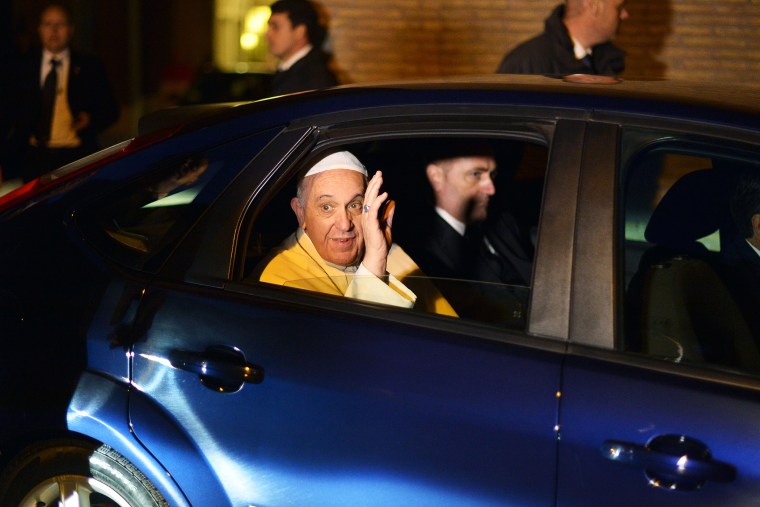Proving yet again that the leader of the western world’s oldest institution is anything but old-fashioned, Pope Francis suggested this week that the Catholic Church could be open to civil unions for people in “diverse situations of cohabitation” -- an ambiguous phrasing that did not exclude same-sex couples.
“Matrimony is between a man and a woman,” said Francis, reaffirming the church’s position on that issue in an interview published Wednesday by the Italian daily, Corriere della Sera, and translated into English by the Catholic News Service.
However, he said, moves to "regulate diverse situations of cohabitation (are) driven by the need to regulate economic aspects among persons, as for instance to assure medical care."
"It is necessary to look at the diverse cases and evaluate them in their variety," he added.
In the year since he began his papacy on March 13, Francis has signaled an unprecedented willingness to soften the church’s position on a number of social issues. Over the summer, Francis famously declared: "If someone is gay and he searches for the Lord and has good will, who am I to judge?”
While the Vatican teaches that gay men and women should be accepted, it classifies homosexual inclinations as an “objective disorder,” and one that could indicate a tendency toward “intrinsic moral evil.” Francis’ remarks were celebrated by LGBT groups as a significant shift in style -- and possibly also substance -- from those of his predecessors.
The pope has similarly made waves for calling on Catholics to “accompany -- not condemn” divorced people, and to scale back the church’s obsession with “small-minded” issues like contraception and abortion. His apparent desire to usher in a new era for the Catholic Church earned him the title of TIME Magazine’s “Person of the Year.”
Francis had previously spoken out in favor of civil unions in 2010 when Argentina was considering legalizing same-sex marriage, which he called “an attempt to destroy God’s plan.” As a compromise, Francis -- then named Cardinal Jorge Mario Bergoglio -- pushed for legalizing civil unions instead.
In the interview Wednesday, Francis also appeared to strike a more progressive tone on contraception than that of his predecessor, Benedict XVI, who called the church's teachings on sexual and medical ethics "non-negotiable values." The Catholic Church bans the use of contraceptives on the grounds that every sexual act should remain connected to “its procreative and unitive purposes.”
While Francis praised the church's 1968 encyclical "Humanae Vitae," which prohibited the use of contraception in the church, he said he "never understood the expression 'non-negotiable values.'"
"Values are values, period," said the pope. "I cannot say that, among the fingers of a hand, there is one less useful than another. That is why I cannot understand in what sense there could be negotiable values."
As with different cases of cohabitation, Francis stressed the need for Catholics to evaluate each situation related to contraception carefully, and apply the teachings of the Humanae Vitae with "much mercy,” as Pope Paul VI intended.
On the role of women in the church, Pope Francis said that, "Women must be present in all of the places where decisions are taken." To that end, he said, Catholic leaders were engaged in "deep reflection.”
Francis also defended the church’s response to the sexual abuse of children by Catholic clergy, saying the church has done "perhaps more than anyone" to solve the problem. Earlier in the year, documents obtained by the Associated Press showed that Benedict defrocked nearly 400 priests between the years 2011 and 2012.
"Statistics on the phenomenon of violence against children are shocking, but they also clearly show the great majority of abuses occur in family and neighborhood settings," Pope Francis said. "The Catholic Church is perhaps the only public institution to have acted with transparency and responsibility. No one else has done more. And yet the church is the only one attacked."
Lastly, Francis reflected on his own phenomenon, criticizing the “mythology” surrounding his every move.
"To portray the pope as a kind of superman, a type of star, strikes me as offensive," he said. "The pope is a man who laughs, weeps, sleeps soundly and has friends like everybody else. A normal person."
